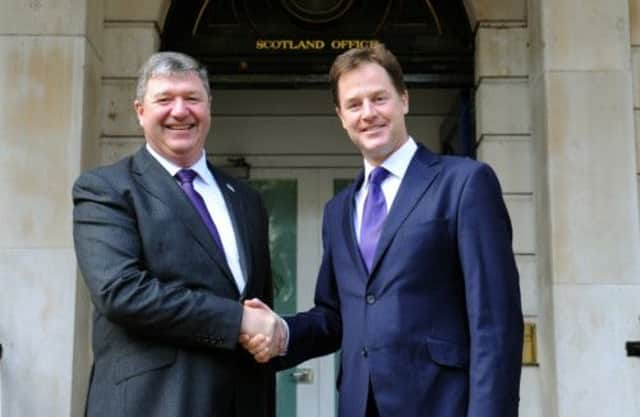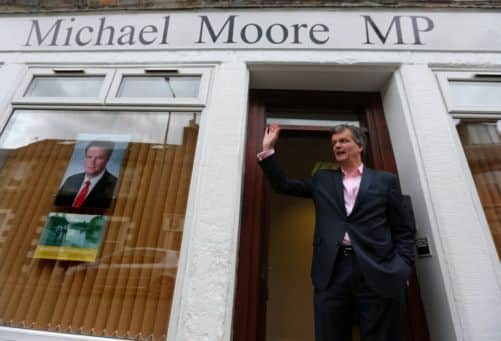Michael Moore out as Lib Dems up referendum heat


In an early sign of how he intends to lead the debate in Scotland, the MP for Orkney and Shetland warned he would “take no nonsense from anybody”.
The surprise decision by Deputy Prime Minister Nick Clegg to sack Borders MP Michael Moore appears to have been made on tactical grounds, with the Liberal Democrat leader saying there had to be “a change of experience” in the Scotland Office.
Advertisement
Hide AdAdvertisement
Hide AdThe switch had been mooted and sources suggested a recent TV debate with SNP Deputy First Minister Nicola Sturgeon, where he came off second best, spelled the end for Mr Moore.


In further evidence the pro-UK parties intend to take a tougher stance, Jim Murphy has been drafted in as a Labour big-hitter for the Better Together campaign.
That followed his demotion from shadow defence secretary to the international development brief.
Mr Carmichael has been praised for his tough and pragmatic approach in his old job as the Lib Dem chief whip, and he is known to be highly rated by the Conservatives as well as his own party.
It is understood David Cameron had at times become frustrated with Mr Moore’s quiet approach, which led to the Prime Minister making two direct interventions to force the referendum to go ahead with just a single question, apparently without him telling the then Scottish secretary.
But Mr Moore, who is understood to be “very disappointed” after learning of his return to the back-benches last Friday, has been credited with steering through the problematic Scotland Bill handing more powers to Holyrood and getting the Edinburgh Agreement on the referendum concluded by taking a conciliatory approach.
He even said that if Scots backed independence, he would resign from the government and be involved in negotiating a good settlement for Scotland.
After his promotion, Mr Carmichael said: “Mike has left an absolutely fantastic legacy. While I am absolutely delighted to be taking on the job, Mike’s a pal of mine. We have had a couple of conversations and he has been very gracious, and he still has got a very substantial contribution to Scottish politics and the referendum to make.”
Advertisement
Hide AdAdvertisement
Hide AdHe tried to distance himself from his reputation as a bruiser, saying there were “enough bruisers in Scottish politics”.
He went on: “People put labels on politicians and I have been in politics for long enough to know that is part of what happens. People like their shorthand. But if that is all that was being wanted, then I wouldn’t be interested in the job, because actually, if we are to expand this debate and bring in people to build on the work we have already done by giving solid analysis on a factual basis, then there has to be a bit more light and shade.”
But he added: “I am still the same guy I was last week and I am not going to take any nonsense from anybody, and I mean absolutely anybody. You can draw your own conclusions there.”
He made it clear he intended to take a robust approach in the referendum debate and in Whitehall, making sure his colleagues and the civil service are on message.
He said: “There are two aspects to the job: the one of getting across Whitehall being Scotland’s voice within government and ensuring that for whatever reason the government here isn’t playing to [First Minister] Alex Salmond’s agenda; also being out, being around the communities of Scotland and putting our case. It’s about campaigning. Campaigning is essentially what I have always done in politics. If you ask anybody in my own party, you ask people here [at Westminster], they will tell you that I am a campaigner.”
He argued the referendum was about “consolidating Scotland’s place in the UK so that we can continue the economic growth that has now started and we can secure the jobs that people want, especially for the young and long-term unemployed”.
After the debate over whether Mr Cameron should take on Mr Salmond in televised debates, Mr Carmichael made it clear he was ready to face the First Minister.
He said: “I am no stranger to TV debates. I love debating.”
A government insider admitted the change in the Scotland Office was also because the Lib Dems had an eye on the 2015 general election and had 11 seats in Scotland to defend.
Advertisement
Hide AdAdvertisement
Hide AdIn an exchange of letters with Mr Moore, Mr Clegg said a “different experience” was required in the run-up to the referendum. But he left the door open for a possible return to the front-bench, telling him he had “no doubt there will be an opportunity for your talents to be deployed” in government again.
Mr Clegg said Mr Moore had become Scottish Secretary at a “critical time” in the country’s relationship with the rest of the UK and “managed the challenges of the situation with great skill and effectiveness”.
But he added: “As we discussed when we spoke on Friday, I believe we now need to draw on different experience in the final year running up to the referendum and I am keen that, just as we have benefited from your formidable skills over the past three years, we take advantage of other experience within our ranks during this period.”
Mr Moore replied: “This has been, and will continue to be, a hugely important time in Scottish politics and that has made it a challenging and rewarding time to be Secretary of State for Scotland.”
SNP Westminster leader Angus Robertson latched on to suggestions Mr Moore lost his job after losing a debate with the Deputy First Minister.
He said: “Nicola Sturgeon bested Mr Moore in a Scottish television referendum debate earlier this year, and the fact that the case for Yes has now prevailed over No in a series of broadcast debates may have played a role in what can only be viewed as a panic reaction by the UK government in sacking him.”
He added: “The problem for the No campaign isn’t the messenger – it is the unremittingly negative nature of its message.”
Profile: Alistair Carmichael
Alistair Carmichael likes to portray himself as an ordinary man, the son of Islay hill farmers, who is where he is because of his passion for politics.
Advertisement
Hide AdAdvertisement
Hide AdWhile he feels his label as a “bruiser” is inaccurate, the former depute procurator-fiscal is a tough operator who can roll with the political punches and dole out more than his fair share to opponents.
He was widely praised after the televised Scottish general election debates in 2010, often bettering Labour’s Jim Murphy and the SNP’s Nicola Sturgeon.
But the man who replaced Jim Wallace as Orkney and Shetland MP in 2001 has really made his reputation as a political operator in his time as the Lib Dem deputy chief whip in the coalition government.
Through force of personality, he has been credited with helping to keep the coalition together and persuade his MPs to take some unpalatable decisions.
His lowest moment came over the rebellion on university tuition fees, but that paled in comparison with some Tory revolts.
Shock move for Kelly murder probe MP
Michael Moore was the biggest casualty, as Deputy Prime Minister Nick Clegg wielded the knife on his Liberal Democrat ministerial team.
But the biggest shock was the appointment of his Lib Dem colleague Norman Baker – who claimed government scientist David Kelly was murdered and that the security services staged a cover-up – as minister of state at the Home Office.
Prime Minister David Cameron also re-shuffled his team of Conservative junior and middle-ranking ministers, with promotions for a number of women.
Advertisement
Hide AdAdvertisement
Hide AdMr Baker quit the Lib Dem front-bench in 2006 in order to research a book on the death of Dr Kelly, who was identified as the source of a BBC story claiming the Labour government’s notorious Iraq dossier had been “sexed up”.
Although an official inquiry concluded Dr Kelly had taken his own life, Mr Baker argued he had been murdered by an Iraqi hit squad and the killing had been covered up by the security services.
He also raised questions over the death of Labour’s Robin Cook, who had been opposed to the Iraq War.
No 10 refused to say if there had been any discussion of Mr Baker’s views or whether Home Secretary Theresa May had been consulted over the appointment. “He is an experienced minister,” Mr Cameron’s official spokesman said. “There is consultation between both parties in the coalition.”
Mr Baker replaced Jeremy Browne, who was regarded as being highly capable, but there was speculation he had paid the price for being seen to be too close to the Conservatives.
Exchanging letters with Mr Browne, Mr Clegg said it was “always very difficult to move colleagues out of government” but that he wanted to give others the chance of ministerial office.
In his response, Mr Browne said he remained “supportive of the government”.
He went on: “I hope the government will continue to strive to be reforming and innovative and avoid the danger of lapsing into transactional trade-offs and deferred decision making.”
Advertisement
Hide AdAdvertisement
Hide AdMeanwhile, former journalist Esther McVey was among several female Tory MPs to be promoted, as Mr Cameron freshened up his ministerial team.
She was elevated from her role as junior disabilities minister in the Department of Work and Pensions to minister of state, with responsibility for employment.
Fellow Tory Anna Soubry moved from health to defence, while Jane Ellison took over her role as public health minister. Claire Perry and Amber Rudd joined the government as whips, while one of the current whips, Karen Bradley, was promoted.
Matt Hancock, a close ally of Chancellor George Osborne, stayed at the Department for Business but with a wider brief, encompassing skills and enterprise.
READ MORE